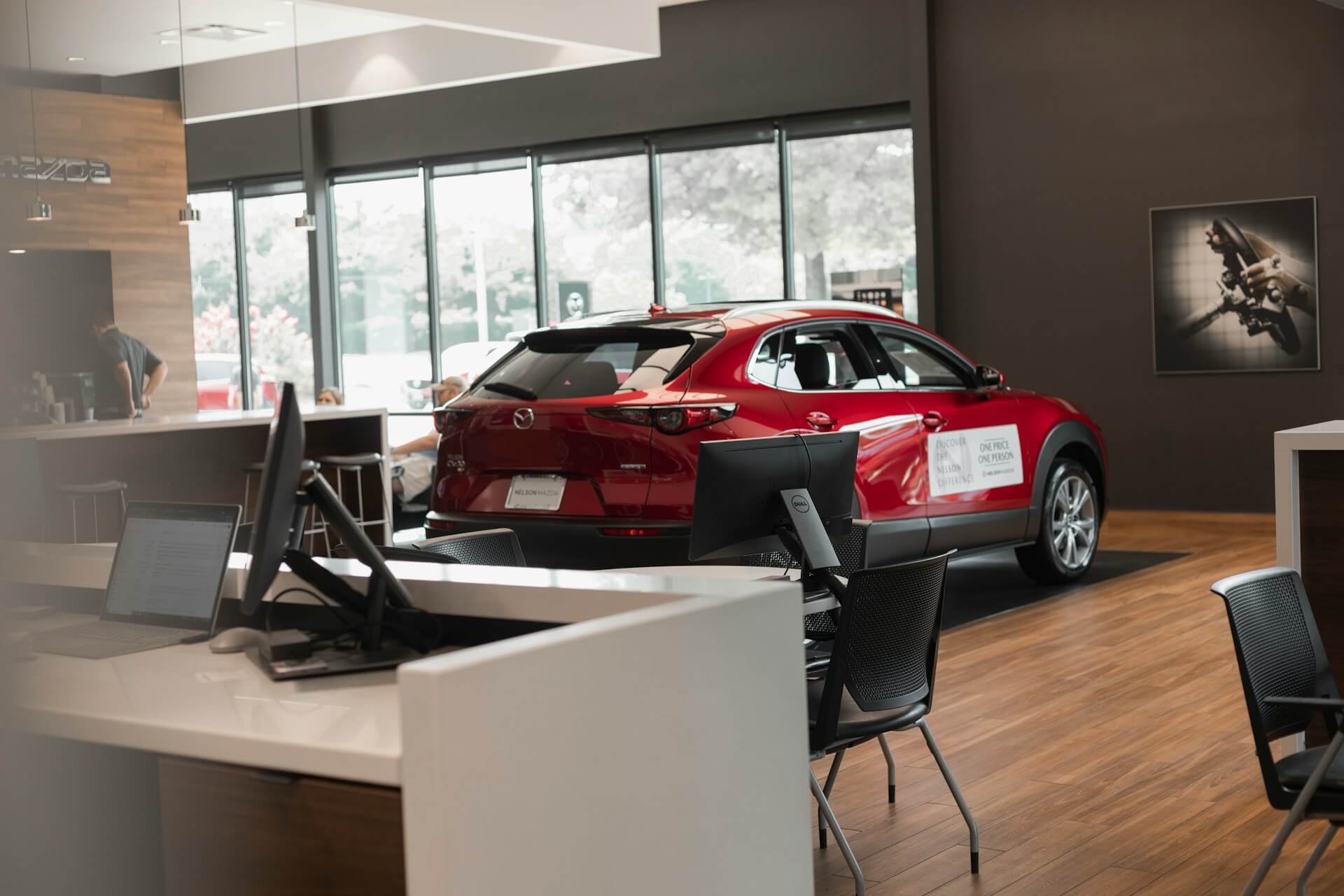Here's Why Your Car Dealership Needs Cybersecurity
In previous blogs, we’ve explored TISAX and the cybersecurity challenges facing the automotive supply chain. However, there’s another critical area in the automotive sector increasingly targeted by cybercriminals: auto dealerships. As the backbone of vehicle sales and services, dealerships are becoming prime targets for data breaches, ransomware, and other cyber threats. Here’s why this growing threat demands attention.
Cybersecurity for Auto Dealerships
In the digital age, the automotive industry has undergone a remarkable transformation. From internet-connected vehicles to online financing tools and digital sales platforms, car dealerships have embraced technology to streamline operations and enhance the customer experience. However, with these advancements comes an ever-growing need for cybersecurity.
If you're managing or operating a car dealership, protecting sensitive customer and business data should be a top priority. Here’s why auto dealership security is a critical investment for your business.
1. Your Dealership Handles Sensitive Customer Data
Car dealerships collect and store vast amounts of sensitive data, including:
- Personal Identifiable Information (PII): Names, addresses, phone numbers, and email addresses.
- Financial Data: Credit card details, bank information, and credit scores for financing applications.
- Driver’s Licenses and Social Security Numbers: Often required for vehicle purchases or test drives.
This car dealership data is a goldmine for cybercriminals. A breach could lead to severe consequences, including identity theft for your customers and lawsuits for your business. Implementing strong cybersecurity measures ensures that this data is encrypted, securely stored, and protected from unauthorized access.
2. Cyberattacks on Dealerships Are Increasing
Small- and medium-sized businesses, including car dealerships, are frequent targets for cyberattacks. Hackers know that many dealerships lack robust cybersecurity protocols, making them easy prey.
Common types of dealership cyber attacks include:
- Ransomware: Hackers encrypt dealership systems, demanding payment for restoration.
- Phishing Scams: Employees may unknowingly click malicious links, compromising the entire network.
- Point-of-Sale (POS) Attacks: Payment systems can be exploited to steal credit card information.
Without proper cybersecurity defenses, these attacks can disrupt operations, tarnish your reputation, and lead to financial loss.
3. Compliance with Data Protection Laws Is Mandatory
Dealerships must comply with a range of data privacy and security regulations, including:
- Gramm-Leach-Bliley Act (GLBA): Requires financial institutions, including dealerships, to protect customer information.
- State-Specific Privacy Laws: Many states have stringent data privacy regulations, such as the California Consumer Privacy Act (CCPA).
Non-compliance can result in steep fines and reputational damage. Cybersecurity measures not only protect your dealership but also help you stay compliant with these regulations.
4. Connected Vehicles Add Complexity
Modern vehicles often come equipped with internet connectivity and telematics systems, which dealerships may need to update or service. While these features provide convenience for customers, they also introduce potential vulnerabilities.
Hackers can exploit these connections to access vehicle systems, putting customers at risk and potentially leaving your dealership liable. Cybersecurity safeguards ensure that connected vehicle data remains secure during servicing and updates.
5. Downtime Can Be Devastating
A cyberattack that locks down your dealership’s systems or disrupts your operations can cost you thousands of dollars per day. From scheduling service appointments to managing inventory and financing applications, dealerships rely on digital systems to operate efficiently.
By investing in cybersecurity, you minimize the risk of costly downtime and ensure that your business continues running smoothly, even in the face of potential threats.
6. Protect Your Reputation
Trust is the cornerstone of customer relationships. A data breach can erode this trust in an instant, causing customers to take their business elsewhere.
Proactively investing in cybersecurity demonstrates to your customers that you take their privacy and security seriously. It builds confidence in your dealership and sets you apart from competitors.
Car Dealer Cyberattack Examples
The automotive industry has become an attractive target for cybercriminals, with several high-profile car dealer cyberattacks highlighting the vulnerabilities within car dealerships and their associated service providers.
CDK Global Ransomware Attack (June 2024)
In June 2024, CDK Global, a leading software provider for over 15,000 car dealerships across North America, suffered back-to-back ransomware attacks. These cyber incidents forced CDK to shut down its systems, causing widespread operational disruptions for dealerships reliant on their software for sales, financing, and service operations. Dealerships were compelled to revert to manual processes, leading to significant delays and financial losses. CDK Global initiated a system restoration process expected to take several days, while also notifying law enforcement and engaging third-party experts to investigate the breach.
Findlay Auto Group Cyberattack (June 2024)
Around the same time, Findlay Auto Group, a prominent auto retailer in the Southwest, experienced a cyberattack that disrupted its data services. The attack affected the company's ability to manage sales and service operations, underscoring the susceptibility of individual dealerships to cyber threats.
Pendragon PLC Ransomware Attack (October 2022)
In October 2022, Pendragon PLC, a major UK-based automotive retailer, was targeted by the LockBit ransomware group. The attackers demanded a $60 million ransom to decrypt the company's files and prevent data leakage. Pendragon refused to pay the ransom, opting instead to strengthen its security measures and work towards data recovery.
AutoCanada Cyberattack (August 2024)
AutoCanada, operating multiple dealerships across the U.S. and Canada, reported a cyberattack that led to substantial financial losses. The breach disrupted sales operations, contributing to a $33.1 million loss in the U.S. The company considered closing its U.S. locations due to the impact of the attack, highlighting the severe consequences such incidents can have on business continuity.
Tesla Model S Software Hack (August 2015)
Although not a dealership attack, in August 2015, researchers demonstrated the ability to remotely hack a Tesla Model S by accessing its entertainment system. This breach allowed control over critical vehicle functions, prompting Tesla to issue a security update. This incident underscores the potential risks associated with connected vehicle technologies.
These cyber attacks on car dealers highlight the automotive sector's vulnerability to cyber threats, emphasizing the critical need for robust cybersecurity measures to protect sensitive data and maintain operational integrity.
Next Steps for Securing Your Dealership
If you’re ready to make cybersecurity a priority, here are the detailed steps to protect your car dealership from evolving threats:
1. Conduct a Comprehensive Risk Assessment
Start by evaluating your current systems and processes. A risk assessment will identify vulnerabilities in your IT infrastructure, POS systems, customer databases, and connected vehicle services. Work with cybersecurity professionals to perform penetration testing and vulnerability scans to understand your dealership's specific risks.
2. Develop a Cybersecurity Policy
Every dealership should have a formal cybersecurity policy that outlines best practices for data security, acceptable use of technology, and incident response procedures. This document should be communicated to all employees and updated regularly as technology and threats evolve.
3. Implement Employee Training Programs
Human error is a leading cause of data breaches. Train your employees to recognize phishing scams, avoid clicking on suspicious links, and use strong passwords. Regular training sessions and simulated phishing exercises can help staff stay vigilant and prepared.
4. Use Multi-Factor Authentication (MFA)
Enhance account security by requiring employees to use MFA when accessing sensitive systems. MFA adds an extra layer of protection by requiring a second form of verification, such as a text message code or biometric scan, in addition to a password.
5. Encrypt Customer Data
Data encryption ensures that sensitive information is unreadable to unauthorized users. Use encryption for all data in transit (e.g., emails, online forms) and at rest (e.g., stored customer records). This is particularly critical for financial and PII data collected during the sales and financing processes.
6. Regularly Update Software and Systems
Cybercriminals often exploit outdated software. Ensure that your dealership's operating systems, payment processing software, and dealership management systems are updated with the latest security patches. Automate updates wherever possible to reduce the risk of human oversight.
7. Implement Endpoint Security
With employees accessing dealership systems through multiple devices—desktops, laptops, tablets, and mobile phones—it’s vital to secure all endpoints. Install antivirus software, firewalls, and intrusion detection systems to protect against malware and unauthorized access.
8. Backup Critical Data Regularly
Ransomware attacks are on the rise, and having a reliable backup solution is key to mitigating their impact. Regularly back up your dealership’s data to secure, offsite locations or cloud-based services. Ensure backups are tested periodically to confirm they can be restored quickly if needed.
9. Monitor Network Traffic
Use network monitoring tools to detect unusual or suspicious activity. These tools can identify attempts to breach your systems in real time, allowing you to respond quickly and minimize damage. With the right platform, business intelligence for car dealerships becomes more than reporting, it becomes part of your defensive toolkit, offering early signals of unusual trends and operational blind spots.
10. Establish an Incident Response Plan
Even with the best defenses in place, breaches can still occur. Create a detailed incident response plan that outlines steps to take if an attack happens. Assign roles and responsibilities, and conduct regular drills to ensure everyone knows how to respond effectively.
11. Partner with a Managed Security Service Provider (MSSP)
Cybersecurity is a complex and ever-evolving field. Partnering with an MSSP allows your dealership to benefit from professional expertise, including 24/7 monitoring, threat detection, and compliance support.
12. Audit Third-Party Vendors
Your dealership likely works with third-party vendors for services such as financing platforms, marketing, and software solutions. Ensure that these vendors meet stringent cybersecurity standards and conduct regular security audits to minimize third-party risks.
13. Segment Your Network
Limit the impact of potential breaches by segmenting your network. For example, separate customer data, vehicle inventory systems, and employee devices into distinct networks. This prevents an attack on one system from spreading to others.
14. Invest in Cyber Insurance
Cyber insurance provides financial protection in the event of a breach, covering costs such as legal fees, customer notification, and remediation. Review policies carefully to ensure they cover the specific risks faced by your dealership.
15. Stay Informed About Emerging Threats
Cyber threats evolve rapidly. Stay informed by subscribing to cybersecurity newsletters, attending webinars, and networking with industry peers. Keeping up with the latest trends will help you adapt and maintain strong defenses.
By following these steps, your dealership can build a robust cybersecurity framework to safeguard operations, customer trust, and regulatory compliance. Don’t wait until it’s too late—take proactive steps today to secure your business against tomorrow’s threats.
Protect Your Dealership from Cyber Threats Today
The rise in cyber attacks on car dealerships highlights the critical importance of safeguarding sensitive customer data and maintaining operational integrity. From protecting dealership systems from ransomware and phishing scams to ensuring compliance with data privacy laws, investing in automotive dealership security is no longer optional—it’s a necessity. With increasingly sophisticated threats targeting connected vehicle technologies and dealership operations, businesses must prioritize robust dealership cyber security measures to protect their reputation, finances, and customers.
Compass IT Compliance specializes in securing car dealerships against cyber threats. Whether it’s ensuring your compliance with regulations, conducting risk assessments, or implementing advanced defenses to prevent a car dealership software hacked scenario, we provide tailored solutions to protect your business. Let us help you stay ahead of evolving threats and secure your dealership’s future. Contact us today to learn how we can fortify your automotive dealership security and give you peace of mind.
Contact Us
Share this
You May Also Like
These Related Stories

CDK Global Hit by Cyberattacks: The Impact on Auto Dealerships

Securing Sea & Road: Cyber Threats in Maritime & Logistics

.webp?width=2169&height=526&name=Compass%20white%20blue%20transparent%202%20website%20(1).webp)
-1.webp?width=2169&height=620&name=Compass%20regular%20transparent%20website%20smaller%20(1)-1.webp)
No Comments Yet
Let us know what you think